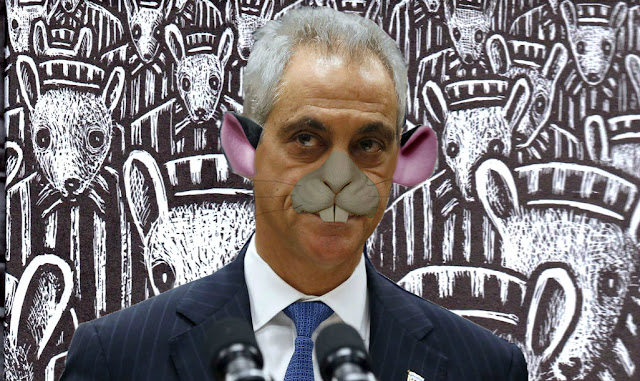Chicago now has another "Feather of Shame" to stick in its "Cap of Humiliation" as it has been named the US's leading RAT CITY for the third year in a row by Orkin the pest control company that uses the list to market its exterminationist services.
Most cities, when they decline, are said to "go to the dogs," but a more accurate expression would be "go to the rats" because as cities decline, inevitably the rats move in.
This is because declining cities become crime-ridden and welfare dependent hellholes, characterised by dirty, slovenly people, lots of nutritious garbage, and dilapidated buildings in which rats flourish and find what experts term "hidey holes."
This stage of decline lasts up until a true state of nature reasserts itself, when the rat numbers are then curtailed by a decline in human-generated garbage and an influx of natural predators like large snakes and various wild members of the feline species.
Right now Chicago is going through the "rat phase," which may be why the present mayor Rahm Emanuel has a first name that almost sounds like "Rat" and actually looks a bit like a long-tailed, disease-carrying rodent.
However, despite his rat-like appearance and the possibility that he might even be "hoist on his own petard," Mayor Emanuel is committed to killing as many rats as possible. On Friday the 13th earlier this month, Emanuel proposed spending an additional $1.5 million in fiscal year 2018 to solve the rat problem.
The extra funds would allow the city to increase the number of mobile rat-killing crews from 25 to 30. In 2016 the city only had 8 such crews.
 |
| In order to escape Rahm Emanuel's death squads some rats have been resorting to changing their names and identities. |
Emanuel also asked the city for another $500,000 to buy 10,000 black garbage carts to replace those gnawed through by the city's exploding rat population. Rats' front teeth grow 4 to 5 inches each year, so that the rats have to wear them down by continuously gnawing on everything around them, including plastic, cement, bricks, wood, and lead pipes.
Figures show that the city had 39,000 rat complaints in 2017, up 30% on 2016. This means that the increase in "rat death squads" is barely keeping pace with the surge in the rat population.
Killing the rats is also starting to raise ethical dilemmas, with animal rights activists complaining about the demonisation of rats and "cruel methods of killing."
Originally, city authorities were putting up posters like this, clearly reminiscent of the style of the German 1930s periodical Der Stürmer to stir up irrational hatred of the rats:
The posters also served to warn children not to eat the tendies that had been laced with rat poison and left out to kill the rats. But, after complaints from animal rights groups, the city decided to change the design to something less "specieist" and alarming:
There is no data yet on whether this has led to a rise in human food poisoning incidents.
There was also controversy about the methods used to kill the rats, after the City tried a "pilot program" using dry ice in 2016. After locating rat burrows, the extermination squads sealed off as many exits as possible, using dirt and newspapers, then put dry ice into the remaining rat hole and sealed it. This essentially created a mini gas chamber because the dry ice -- frozen carbon dioxide -- evaporated into a gas that then suffocated the trapped rats, which were then left to decompose or be eaten by new rats.
At the time Mayor Emanuel was extremely positive about the new method, calling it "smarter and more effective," but the project had to be stopped when city officials learned that it had not been approved by the federal Environmental Protection Agency.
But killing the rats in this way or any other is likely to have a limited effect, because rats can breed extremely fast. Rats reach sexual maturity aged just 4 or 5 weeks, and the female rat has six litters a year, with up to 12 rat pups in each litter. This means that a population can swell from two rats to well over a 1,000 in a single year.
As long as the conditions for rat growth increase -- a dysfunctional, welfare-dependent population with poor hygiene, living in dilapidated buildings with plenty of garbage -- then the rat population is set to continue to grow.
In fact, killing them at a faster rate will only accelerate their evolution, ultimately creating a race of super rats immune to our poisons. Looking at this picture of Rahm Emanuel, I wonder if we haven't been here before.





























